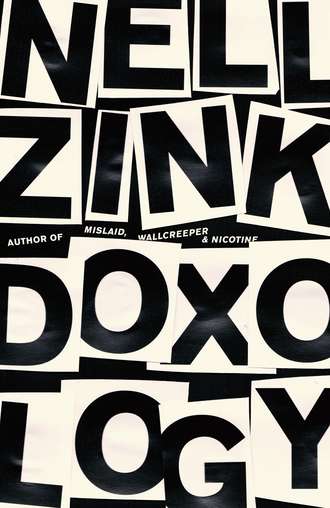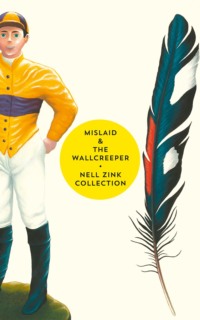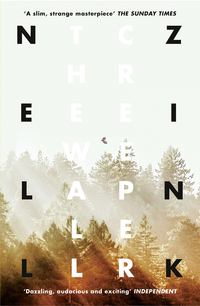
Полная версия
Doxology
THE NEXT MORNING, PAM TOLD SIMON THAT SHE WAS GOING TO THE PRACTICE SPACE without him because she could afford it on her own. Ten dollars an hour isn’t much for a programmer. She said she was done with the Diaphragms. The band had never worked. She had a new project that might work. To forestall any hopes on his side, she said he wasn’t welcome in the new project.
The whole routine made her nervous. She stood by the door, guitar on her back and effects bag in her hand, making this insulting speech as if expecting immediate capitulation, knowing better than to expect it.
Simon said, “That’s my practice space, not yours. I already advertised for a new guitar player.”
“So why aren’t you going there now?”
“I don’t have one yet. But I will.”
She set her things down and said, “Simon, I know our love was beautiful, but we need to break up.”
“I’m not moving out. I can’t even afford to practice by myself. You’re the one who just said ten dollars isn’t a lot of money. You move out. You can afford a place of your own. Just go.” He turned sulkily toward the cereal box on the table and sprinkled a few more squares of Chex into his slowly warming milk.
DANIEL DIDN’T WANT TO REHEARSE ON SUNDAY MORNINGS. HE DIDN’T SEE ANY REASON to get up early, cross town, and pay money to do something they could do in his home if they didn’t get carried away with the volume. Over miso soup on Saint Mark’s Place—his first date with Pam—he said, “Why spend money when we can just turn down?”
“Tube amps don’t work like that,” she said. “They need to warm up to sound right, and they need to sound right to warm up. There’s no headphone jack.”
“Why don’t you get a transistor amp, so you can practice at home?”
“No way,” she said. “I’ve been down that road. We rehearse under realistic conditions.” She sketched her experience with the Slinkies, saying it was time to move forward, at least into the eighties, now that it was 1990. There was nothing embarrassing about being behind. The sixties had hit pop culture around 1972, just as punk was taking off. “You ever see Birth of the Beatles?” she added. “We need to work like busy bees to get to the tippy top.”
“Darby Crash died the day before John Lennon.”
“Todd is God,” she said. “But yeah, maybe Darby’s what put Chapman over the edge.”
Daniel suppressed a smile. He had nothing against John Lennon, and no sympathy for the man who shot him, but knowing that Todd Rundgren had composed “Rock and Roll Pussy” about Lennon, that Lennon had responded with an open letter to “Sodd Runtlestuntle” in Melody Maker, and that Mark David Chapman had cared enough to take the affair to its logical conclusion while wearing a promotional T-shirt for Todd’s latest album—it was a kind of knowledge he didn’t expect a woman to have, much less care enough to say something post-sensitive about. He was starting to get a serious crush on her. He personally had first heard of John Lennon the day he died. His family was more into Up with People.
LATE WEDNESDAY NIGHT, PAM WAS AMONG THE FIRST TO BUY THE VILLAGE VOICE AND turn to the real estate classifieds. She strode to a streetlamp to read. What she saw made her guts clench. Since her last move, her budgeted residential zone had shifted far away from Manhattan, past Brooklyn Heights. The studios she could afford were in places like Greenpoint and Astoria. Even Park Slope had apparently turned into a bourgeois hell of first-time homebuyers bent on pretending their stucco townhomes were brownstones on the Upper East Side.
She regarded Brooklyn as a cultural wasteland. A summertime stroll up Flatbush with the devoted Brooklyn fan Joe hadn’t changed her mind. In a shop window she’d seen a dead branch spray-painted gold in a silver-painted vase for eighty dollars. She had attended an art opening in Williamsburg once, down near the water, and it still stuck with her as though it might recur as a final image of vacuity before she died. She had narrowly missed the era when Alphabet City was controlled by Latino crime syndicates and inhabited by the living dead—honest-to-goodness cannibals—but Williamsburg was creepier, because there was nobody around. No buildings standing open with dim-eyed figures guarding holes leading to cellars; just walls and chain-link on all sides, and she and Joe the only pedestrians for miles. Cannibals could have eaten them right there on the street, without taking the trouble to drag them inside a building. When they got to the opening, it turned out to be site-specific installations made of found objects. None of the so-called artists could afford supplies or a studio. It was literal arte povera. Then she sliced open the top of her right ear on a splinter of broken mirror some wannabe had hung from the ceiling with twine.
She read the ads for lower Manhattan again. Her hands and feet turned cold from the adrenaline, as if she’d been caught in a trap. To all appearances she was not leaving her lease on Bleecker Street. If Simon wasn’t either, she would have to put up with him.
III.
Operation Desert Shield marched inexorably toward war. The USA was ranging its armaments against Saddam Hussein and preparing to lay waste to his country. Pam often wished aloud that the Selective Service System would draft Simon into the battle for Kuwait.
Daniel had talked about the draft so much that she didn’t realize there was no draft. He was in touch with the American Friends Service Committee, on Joe’s behalf as well as his own, preparing for them to become conscientious objectors. He even took Joe to a Quaker meeting, but only once.
There was officially a recession on. Corporate executives were moaning that double-digit annual profit growth was a thing of the past. Even RIACD’s Wall Street clients were strapped for cash. They had installed networked PCs before firing the staff the PCs would make redundant. Two years earlier, when Pam parachuted into an office, she could be sure of seeing secretaries in motion, walking briskly in and out of their supervisors’ offices, running files from room to room, controlling the speed of Dictaphone tapes with foot pedals, typing letters on IBM Selectrics. Now those same secretaries sat at bare desks half asleep, while their bosses answered correspondence privately on Lotus cc:mail. Occasionally one would stand up to take a print job off the printer in the printer room. At a big reinsurer, Pam saw a woman typing a chapter from the Book of Ezekiel. She learned that the company’s desktop publishing pool had resolved, as a devotional exercise, to enter God’s Word into WordPerfect documents. Not because anybody needed a printout; they all had the book at home. It was a means of communion with the Divine. It could not end well.
The winter settled in like a poisonous fog around the redundant American people. The war ramped up. Yellow ribbons appeared. The streets were dark at four o’clock. The wind whistled and rattled the signage. Pam and her coworkers sat idle in the conference room, watching a lot of TV.
In mid-January 1991, things got interesting. A CNN correspondent was trapped in Baghdad. He described his fear in great detail, conveying a sense that war was ultra-scary. The battlefields looked like barbecue grills—not arrangements of discrete wrecks and craters, but greasy charcoal melted to the pavement. America the Beautiful was taking no prisoners.
Pam went to visit Daniel after work and found him downstairs in the store, huddled up in his coat, watching CBS with Victor. He pointed at the TV and said, “They’re landing Scuds on Tel Aviv. It’s Armageddon.”
Daniel was not remotely Jewish, and he didn’t know any Israelis, but he had been raised in the kind of Christian household that promotes respect for the defense capabilities of Israel and belief in the apocalyptic consequences of putting its back against the wall. Not that Israel couldn’t defend itself. Plucky little Israel had fended off repeated Arab invasions, and not through the power of prayer. It had fought valiantly and developed—with French assistance, though Daniel couldn’t imagine why that was—a nuclear deterrent. Those who aided the enemies of Israel died. That’s what they did.
For example, the British engineer who decided to help Saddam build a cannon big enough to put two tons into orbit. He just up and died of gunshot wounds in Brussels.
The respect was possibly overgenerous and the eschatological expectations overblown, but it was hard for Daniel to imagine Tel Aviv taking a Scud missile lying down. To make sure Pam knew what he meant, he added, “This is World War Three!”
“Are they with nerve gas?”
“They don’t know yet. Nobody wants to be first to take off the gas mask and find out. But it can’t be nerve gas, right? Israel would so totally nuke Baghdad. They want to draw Israel into the war, but they don’t want to die. If Israel sends even one plane into Iraqi airspace, it could draw the whole Arab world into the war.”
“What do you think, Victor?” she asked.
“Americans supply Israel with many things. Israel won’t interfere in our war.”
“I think Israel goes its own way,” Daniel said. “They play off all sides against each other. They get less American support than you think.”
“Israel and Iraq are nothing,” Victor said. “If they nuke each other, it’s not World War Three. It’s jackals fighting over a desert.”
“Whoa,” Pam said, unused to hearing anything that could possibly have been construed as anti-Semitic.
“Any war that goes nuclear is World War Three,” Daniel said. “And nuclear war involving Israel is Armageddon, any way you cut it up. So this is potential nuclear Armageddon. Babylon the great is fallen—is fallen … for all the nations have drunk of the wine of the wrath of her fornication!” He shouted the last bit because it was part of a Tragic Mulatto song.
“Let’s wait first and see whether they use nerve gas,” Pam said.
Victor offered to open a bottle of vodka to celebrate the coming American win. Daniel’s response was to proclaim, “Let us eat and drink, for tomorrow we die.” Victor reached under the counter, and Pam expressed admiration at his stocking bootleg vodka, which counted as agreement to help them drink.
They watched TV until eleven o’clock. Pam said she was too drunk to go straight home on foot. She went upstairs with Daniel to have some herbal tea.
There they had sex for the first time. His doubts, hesitations, and regrets were as nothing in the face of the coming apocalypse. She felt none of the above. She wished she’d had the idea of sleeping with him long before.
SEX CAME AND WENT IN PAM’S LIFE. SHE HAD PICKED UP ENOUGH OF THE TAIL END OF seventies culture to call it “love.” She never had sex unless she was “in love.” She could fall in love in the space of fifteen minutes. She had offered many appealing strangers tender kisses, some of which became hand jobs in short order, while others quickly progressed to “making love.”
As a result, all her boyfriends had been approximately as charming as Simon. She fell in love as a prelude to sex. Then she had ethical qualms about unloading people in the morning, because she was in love. Her ideal of sex was intimate and gentle, and she kept having it with strangers.
She knew all about bad sex. Not rough sex; she would have called that “assault.” She knew that gay men pick up rough trade at the risk of being beaten to death, that submissive men role-play excuses for penetration, and that straight women take both behaviors to extremes. She understood herself to be a hedonist. She never sought out unpleasant consequences. They just kept happening.
Sex for Daniel was the opposite—consistently too much fun. His earliest sexual experiences had involved fondling the genitals of Christian schoolgirls he never once kissed. He’d even gotten a blow job from one of them once, and he wouldn’t have kissed her for a million dollars after that. Her feelings were hurt, but what could he do? How were his sexual preferences his fault?
In college he’d gotten a crush on an eccentric and lonely black women’s-studies major who slept around but never had intercourse with anyone. She never said why not, and she never touched him, so he never felt he had standing to find out. At times he thought they were two virgins, born to be together, and at other times he thought she was recovering from a rape trauma and subsequent promiscuous phase; he never asked. In her senior year she came out as lesbian, and he felt he’d missed his one chance. He had two years of college left to go, and nobody he knew of liked him that way.
At an art opening the fall of junior year, he met a Thai woman on an exchange program to the veterinary school. They corresponded for months. That was sexually rewarding (not). He’d never known Buddhists were so strict about premarital sex.
His senior year, he hooked up with a scraggly-haired anthropologist. She had sour armpits and annoying mannerisms such as picking her nose and relating everything to cybernetics, but she said she liked to get fucked. Once, early in their liaison, she diverted his member into her anus with her hand, and he didn’t immediately notice. When he did, she explained that she had vaginal discomfort from a yeast infection. He suspected that she felt no sexual pleasure, of any kind, ever, and that it was a matter of indifference to her how he did what.
On one occasion, he was unfaithful to her with a pretty townie he met at a heavy metal show. When they were done, the townie said, “Did you know I’m fifteen?” He was terrified. She promised to keep quiet for a hundred dollars. But his friends at Subway knew that she was nineteen and an amateur, so it was okay.
In short, his previous experiences of sex had less than nothing to do with love. Pam opened a new chapter in his life. Where the other consummated affairs seemed to have emerged from the sewers of his mind like roaches swarming out of a toilet, Pam descended from above, bringing all he held most dear: beauty, art, music, cyberpunk, the Lower East Side. Kissing her was the most important thing.
Band practice was interesting after that. Joe sang his songs while playing counterpoint melodies on the bass. Pam looked straight down at her left hand, and Daniel focused on the brushes with which he played warped floor tom and broken snare. Every so often, the couple raised their eyes and nodded almost imperceptibly in greeting.
IN HIS FUNCTION AS MANAGER AND LABEL EXECUTIVE, DANIEL BOUGHT THE SELF-HELP manual Book Your Own Fucking Life. It was a punk rock venue guide to the USA and Canada, produced by an anarchist collective in Minneapolis. He observed that meaningful implementation of the book was predicated on possession of a vehicle. He was financially committed to Marmalade Sky to the tune of the $800 the first single was going to cost him. There was nothing in his plans about thousands of dollars for transportation. The thought of trying to store a van in lower Manhattan made his insides droop. Whether or not the street sweeping machines came, you had to move your car every day. Official car theft rates were kept low by the inconvenience of reporting crimes, but a car parked on the street still had annual insurance premiums roughly equal to its value. A worthless car could be relied on to stay put if you removed some vital part such as the alternator every night and took it upstairs.
He broached the necessity of renting a van some weekend to play Trenton or Philly, traditional springboards for ambitious and creative bands that had trouble cracking the mercantile culture of NYC rock.
Pam said, “What’s next, Passaic? This city not big enough for you?”
Joe elucidated his view that New York City was the industry’s one and only mecca. Bands from other places dreamed all their lives of playing there, paying serious money—like fifty bucks—for the privilege of presenting short sets in exploitative clubs such as Downtown Beirut. Marmalade Sky, an endemic growth, could play New York any time it wanted, by setting up out on the sidewalk or next to the fountain in Washington Square. He had seen a rig with a Peavey and a car battery. They could play wearing fun costumes. He had seen a girl dressed as broccoli.
“No, no, no,” Daniel said. “I’m not busking for quarters! I have a job!”
He noted inwardly that Marmalade Sky’s need for a label and a manager was not urgent, and possibly not even real. The band itself might not be real. He felt it might be helpful to know relevant people who could confirm the band’s reality. If, say, he were on speaking terms with someone who booked clubs or a music journalist—he didn’t know how or where to start, but he did have the idea. He resolved to acquire a kick drum and hi-hat cymbals.
He wasn’t thinking straight. Pam worked days, and he worked nights. On weekdays they saw each other in the evenings, when she got home from RIACD and he hadn’t left yet—generally from about seven to ten—which was enough time to cook or get takeout, fool around, get cleaned up, and go home to sleep and uptown to work, respectively. On weekends they went to shows. He was losing sleep.
When he finally asked her, Pam proffered her habitual disinterested analysis. Of all the factors in their success, she said, there was only one under his control: the debut single, which he should urgently bring to fruition. After it came out, other bands would hound him with demo tapes. For the sake of buttering up a label owner, they would offer Marmalade Sky choice opening gigs.
He replied, “I have the money to put out a single, but no band to put on it. Maybe you can tell me when Marmalade Sky is going to start being non-heinous.”
“Put up a flyer at Kim’s,” she said. “Or an ad in the Voice. Find some band that has a decent cassette and offer them a seven-inch. Or record Joe as a solo project and let him sell it to his three hundred best friends.”
A STRANGE PHENOMENON HAD TAKEN HOLD OF PAM’S CHECKING ACCOUNT SINCE SHE had met Daniel. It was growing. While single, she had not skimped on cover charges, restaurant meals, instruments, electronics, or liquor by the drink, and whenever she couldn’t find her wallet—a regular occurrence—she had bought a new one to fill with new cash. Since meeting him, she had been spending money rather than hemorrhaging it, and she was saving hundreds of dollars a month.
But she didn’t offer to contribute money to Lion’s Den. It was his label, not hers. She had enough business experience to know that it wasn’t a business. It was an art project. Investing in it would contravene the project goal, which was to be Daniel’s art. He wanted autonomy more than he wanted success. He wanted to design record covers, compose press releases, and gain a reputation—among the handful of people who mattered to him—as a man of wit and taste. It had nothing to do with turning $800 into $2,000 in the fullness of time and paying her back.
She didn’t try to explain herself. It was hard to explain. As an art form, rock’s medium was commercial success. The tippy top was its guiding light. Having a band was about being a rock star, a fantasy of ultimate autonomy in which you got paid megabucks to be your worst self.
Meanwhile she was slogging away as a programmer, and he was sitting up all night setting Latin abbreviations in italics. Marmalade Sky might be art for art’s sake, but if it didn’t offer them at least a chance of rock stardom, it wasn’t worth doing.
DANIEL TURNED HER SUGGESTION OVER AND OVER IN HIS MIND. JOE COULD PLAY MORE instruments, and play them better, than all three of them put together. He had no shortage of material. The missing element was the multitrack studio to produce the master tape.
He thought briefly of buying microphones and a four-track and learning to use them—or, more realistically, letting Pam figure them out—but the equipment would cost almost as much as pressing the single, and he’d still have to rent a soundproofed room, free of garbage trucks, car stereos, car alarms, and honking, to record it in, and hire a real producer to oversee the recording and mix it down. Inadvertent technical errors might commit to vinyl the excruciating sound of tape hiss or sixty-cycle hum, making the single too lame to distribute.
He said to himself, “Fuck it,” as people often do when deciding to spend money they don’t have. Joe instantly agreed to record a seven-inch with two three-minute songs in a single afternoon. Daniel booked a studio with an engineer in Hoboken, about three months into the future, and paid a deposit of $200.
PAM’S PERIOD WAS LATE. SHE DIDN’T WANT TO TELL ANYONE JUST HOW LATE. SHE AND Daniel had had unsafe sex more than once. It didn’t feel like it counted, because it was such a small fraction of the total sex they’d had. Okay, she admitted to herself: five weeks late. If her period skipped another week, it would be an open-and-shut case. She would need an abortion.
She knew that if she told Daniel, he’d offer to pay, and there would go Lion’s Den records. She had plenty of money. The only way to get an abortion and keep the single was to tell Daniel nothing. He was already in over his head, buying studio time for a friend when he could have pressed a clean master provided for free by strangers. In any case it might already be too late for a black-market poison-pill-style abortion with smuggled RU-486. It would make her sick all weekend, cramping and bleeding until she swore off sex for life, but at least she wouldn’t have to make time for a clinic. She needed to hurry. She’d have to explain being sick to Daniel. Food poisoning, maybe? She would have to come up with what she ate and where. She didn’t feel like rushing into being sick. Besides, the pregnancy might resolve itself unobtrusively. If she skipped the poison pill and stuck to old-fashioned abortion clinics, she had months left until the third trimester.
All she needed was to keep the information away from Daniel until she got organized and found out where they do second-trimester abortions.
She was a programmer and a punk, versed in the mortification of the flesh, accustomed to treating her body as a sink and a tool. She was young and inexperienced, not in tune with her own biology and nature. She was not thinking straight. She was not thinking at all to speak of. In the corner of D.C. where she grew up, abortions came from Mom. You told your mom you’d been stupid, and she made the relevant appointments. You handed off the thinking to someone else, like a user, not a programmer. Pam didn’t make the appointments.
Right around week ten, she grabbed herself by the scruff of the neck, set herself on her feet, and confronted Daniel. She said, “Daniel, I do not feel good.”
“Is something wrong?”
“I’m pregnant.”
“From me? Hey, I don’t know what you get up to after I go to work! Maybe you turn tricks under the viaduct.”
“It has your eyes.”
“When did you find out?”
“I haven’t found out yet. I keep putting it off. I need to get on the stick and do something about it.”
“Do you not want a baby?” Seeing her shake her head, he asked, “Is it because of the Art Strike?”
“A baby is not creative work!”
“Are you sure you don’t want a baby ever in your life? Most people want one sooner or later. Like me. I always assumed I’d have kids someday.”
“What are you saying?”
“I know we never talked about it, but right now I’m thinking, ‘If not now, when?’ You’d be a total bottom-shelf mother.” (“Bottom-shelf” was positive, since in midwestern refrigerators the top shelf was where you put the cheap beer for guests to notice when they were making themselves at home.)
“And ‘If not me, then whom?’” Pam said.
“Random unwed parenting is standard practice back where I come from! We Christians welcome every new Christian soul.”
“It’s standard everywhere,” she said, “but not for me. And the reason we never talked about it is that we’ve been dating for maybe four months.”
“Obviously,” he said firmly, “abortion makes sense on paper. But I don’t live my life on paper. I would have been happy to know you were pregnant with my child the first time I saw you.”
“You’re just weird,” she said.






